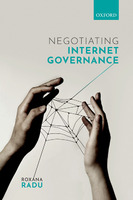Negotiating Internet Governance
| dc.contributor.author | Radu, Roxana | |
| dc.date.accessioned | 2019-04-25 10:51:07 | |
| dc.date.accessioned | 2020-04-01T10:31:19Z | |
| dc.date.available | 2020-04-01T10:31:19Z | |
| dc.date.issued | 2019 | |
| dc.identifier | 1004863 | |
| dc.identifier | OCN: 1097591474 | en_US |
| dc.identifier.uri | http://library.oapen.org/handle/20.500.12657/25231 | |
| dc.description.abstract | What is at stake for how the Internet continues to evolve is the preservation of its integrity as a single network. In practice, its governance is neither centralised nor unitary; it is piecemeal and fragmented, with authoritative decision-making coming from different sources simultaneously: governments, businesses, international organisations, technical and academic experts, and civil society. Historically, the conditions for their interaction were rarely defined beyond basic technical coordination, due at first to the academic freedom granted to the researchers developing the network and, later on, to the sheer impossibility of controlling mushrooming Internet initiatives. Today, the search for global norms and rules for the Internet continues, be it for cybersecurity or artificial intelligence, amid processes fostering the supremacy of national approaches or the vitality of a pluralist environment with various stakeholders represented. This book provides an incisive analysis of the emergence and evolution of global Internet governance, unpacking the complexity of more than 300 governance arrangements, influential debates and political negotiations over four decades. Highly accessible, this book breaks new ground through a wide empirical exploration and a new conceptual approach to governance enactment in global issue domains. A tripartite framework is employed for revealing power dynamics, relying on: a) an extensive database of mechanisms of governance for the Internet at the global and regional level; b) an in-depth analysis of the evolution of actors and priorities over time; and c) a key set of dominant practices observed in the Internet governance communities. It explains continuity and change in Internet-related negotiations, opening up new directions for thinking and acting in this field. | |
| dc.language | English | |
| dc.subject.classification | thema EDItEUR::L Law::LN Laws of specific jurisdictions and specific areas of law::LNQ IT and Communications law / Postal laws and regulations::LNQD Data protection law | en_US |
| dc.subject.classification | thema EDItEUR::U Computing and Information Technology::UB Information technology: general topics::UBL Digital and information technologies: Legal aspects | en_US |
| dc.subject.other | Internet | |
| dc.subject.other | governance | |
| dc.subject.other | authority | |
| dc.subject.other | practices | |
| dc.subject.other | international relations | |
| dc.subject.other | law | |
| dc.subject.other | multistakeholder | |
| dc.subject.other | data | |
| dc.subject.other | decision-making | |
| dc.subject.other | private regulation | |
| dc.title | Negotiating Internet Governance | |
| dc.type | book | |
| oapen.identifier.doi | 10.1093/oso/9780198833079.001.0001 | |
| oapen.relation.isPublishedBy | b9501915-cdee-4f2a-8030-9c0b187854b2 | |
| oapen.relation.isFundedBy | 07f61e34-5b96-49f0-9860-c87dd8228f26 | |
| oapen.relation.isbn | 9780198833079 | |
| oapen.collection | Swiss National Science Foundation (SNF) | |
| oapen.pages | 228 | |
| oapen.place.publication | Oxford, UK | |
| oapen.grant.number | 10BP12_185531 | |
| oapen.grant.program | Open Access Books | |
| oapen.grant.project | Negotiating Internet Governance | |
| oapen.identifier.ocn | 1097591474 |

